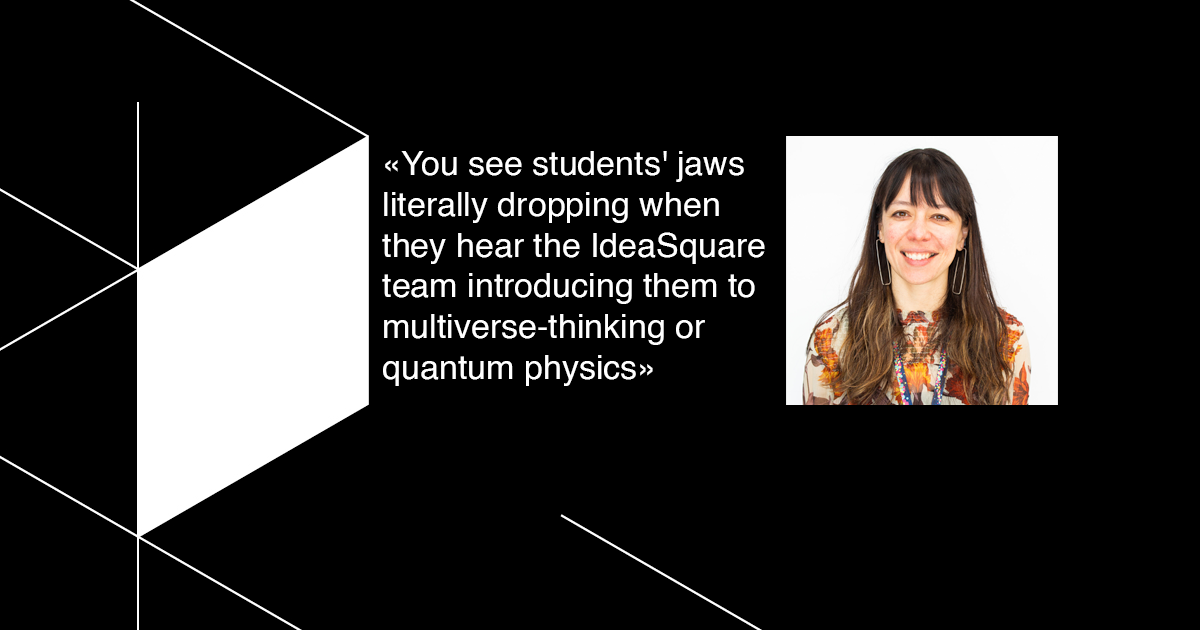«You see students' jaws literally dropping when they hear the IdeaSquare team introducing them to multiverse-thinking or quantum physics»

A conversation with Christine Thong about the importance of an evoking learning environment
Christine Thong has been running the CBI A3 student programme at IdeaSquare for 5 years, a Design Factory Melbourne initiative which builds on earlier Challenge Based Innovation (CBI) pilots at IdeaSquare. She is also the author of IdeaSquare's "tech cards", a variety of easy-to-read information sheets describing CERN technologies "with simple metaphors". Their aim, says Christine, is "to bring the CERN technologies closer to students even if they have very little technology knowledge". Using design innovation to connect CERN technology with societal needs is Christine's modest contribution to ensure that "everyone can make the most of their experience regardless of their previous academic background".
Q. Christine, coming from the other side of the globe, what struck you most about IdeaSquare when you first came here?
A. For me, the true uniqueness of IdeaSquare is the context where it’s located: Switzerland, the mountains, the scenery, a different language, CERN, the home of LHC and ATLAS… Of course, I was amazed by their values, too. Their approach to innovation, their unorthodox practices, the low hierarchies, the carefreeness of not minding having people over to prototype and experiment, their relaxed attitude in the kitchen… Once you arrive at IdeaSquare, you get a sort of different feeling from the one you thought you'd have. Also, no place is what it is without its people —at IdeaSquare, all this uniqueness is very much lead by Markus Nordberg and Pablo Tello.
And what do your students think of this place?
When our Australian students come and visit IdeaSquare, you can immediately sense their bewilderment. It's so memorable to see their jaws literally dropping when they hear the IdeaSquare team introducing them to multiverse-thinking or quantum physics. You watch them go from dazed and confused to enlightened. Their minds are just filling with all this new stimuli and approaches —that literally shifts their perspective. I truly believe that being at CERN creates and fosters a different attitude in all of them: they immediately start questioning things and embracing curiosity.
And how is that any different from the other institutions of the Design Factory Global Network (DFGN)?
Well, CERN’s mission is societal good, it's not a commercial mission. It's not working with companies or organizations that have economic drivers, there is an entirely different motivation which really makes it special.
Is there any memorable moment you remember experiencing at IdeaSquare?
So many! Especially the social interaction moments: the culture exchange, the bonding... For example, one time we played a game called “Chinese whispers”. I started a message and it had to come around all the way to Markus. I can't remember what the message was, but I remember the last student laughing in despair saying: “They can't have possibly said that!”. We were cracking up! Or also, one evening, out of the blue, a group of students from Italy, Portugal, Greece and Australia just started performing their national dances at R1. And this in the middle of CERN! They kept putting on music and everyone was dancing and having so much fun. You could see there were no hierarchies, it was just “all joining in”. Pretty much IdeaSquare’s methodology, if you think of it.
You lead the CBI A3 student programme at IdeaSquare. Do you think this kind of programmes bring value to a student’s career?
Absolutely. Students come back absolutely thrilled. I always have to grin when I hear their comments: “Oh my God, I just presented something at CERN!”, or “Dude, I just spoke to a CERN scientist, and he thought my idea was good!”. It’s very rewarding to see that everyone at IdeaSquare is so generous with their time and that they care about what we're doing. This is hard to find elsewhere.
If you had a credit card with unlimited money, what would you spend it on at IdeaSquare?
I would buy all the time from the people at IdeaSquare so they could stop being busy and they could spend more time with our students. Imagine having a month of an expert’s undivided attention for each student —that would be amazing! I’m sure the learning outcomes during CBI A3 would be three, four times the size they are now. And if I had some more spare money, I would fly all of the people in the DFGN network to IdeaSquare for a month and make them participate in the CBI programme themselves!
Christine Thong is an Academic Director at the Design Factory Melbourne, one of the key partners for student programmes at IdeaSquare. She also works as an associate professor at Swinburne University of Technology (Australia), where she is currently a PhD candidate in the fields of Industrial, Product, Interaction and Experience Design. At IdeaSquare she is the coordinator of the CBI A3 student programme, on which she published a case study in the CERN IdeaSquare Journal of Experimental Innovation.